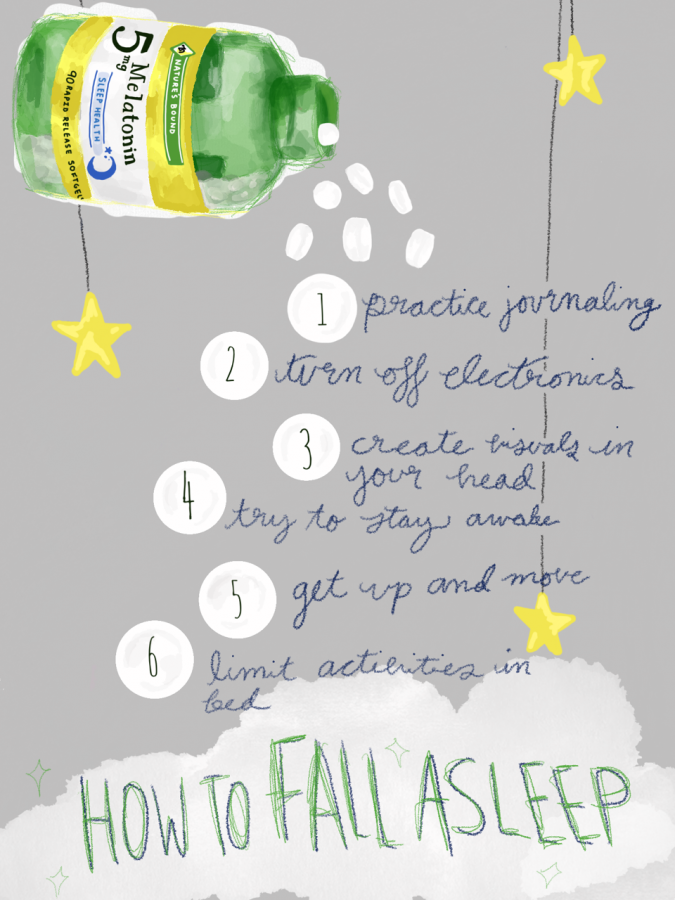Silence to the Suffering: How to Fall Asleep
Tips and tricks to falling asleep before three a.m.
Although falling asleep is difficult, a few lifestyle changes could make a world of difference.
You’re tired of being tired, tired of being ready to fall asleep and never doing so. You’re tired of going to bed exhausted and waking up exhausted. You’re downing nine milligrams of melatonin each night, which is the max, yet somehow you’re still not falling asleep until three a.m. What are you doing wrong? While it’s certainly not simple, here are six tips and tricks to help you get to bed before the sun comes up:
Practice Journaling
Before you attempt braving the treacherous trail that is falling asleep, try writing in a journal, a method proposed by numerous articles, such as “20 Simple Ways to Fall Asleep.” What you choose to write is up to you, anything from venting to listing things you’re grateful for being a possibility. However, writing down thought spirals is most recommended, for it can help you deal with anxious thoughts and relieve stress, something that often keeps people from falling asleep. And before you write off this falling-asleep method, for keeping a diary is something no self-respecting teen would do, don’t dismiss it just because you see it as a diary. Journaling really can help you fall asleep if you struggle with anxiety – plus, no one has to know.
Turn off Electronics
“Smart phones, e-readers, tablets, computer screens, TVs, and digital clocks emit blue light, a short frequency of light that may be harmful to the eyes and disrupt sleep,” reads an article from On Health, reviewed by Charles Patrick Davis, MD and PhD. Not only do people intentionally stay up just to be on their phone, but the blue light that electronics emit also keeps you awake. That being said, if you insist upon being on devices until late at night, turn on night shift to reduce said blue lights.
Create Visuals in Your Head
“In a 2002 study from the University of Oxford, researchers found that people who engaged in ‘imagery distraction’ fell asleep faster than those who had general distraction or no instructions,” says the article from Healthline “How to Fall Asleep in 10, 60, or 120 Seconds.” For those who are more creative and often find themselves staying up to write stories in their head (a problem I often encounter), you can actually utilize this skill to help you fall asleep. Instead of letting your brain wander off in fairytale land as it pleases, direct it to your ideal, calming environment. Whether this be letting cool waves lap up and over your feet or wandering about in a small, secret cove in some woods, explore this area and focus on the image. If you struggle focusing on this path or imagining it, there are many guided tracks on YouTube that will help you with this.
Try to Stay Awake
This may seem extremely counterintuitive, but focusing on staying awake is an actual strategy named “paradoxical intention,” writes Arlene Semeco, MS, RD in “20 Simple Ways to Fall Asleep Quickly,” Healthline. This method is used because forcing yourself to fall asleep causes stress, actually preventing sleep, and trying to do the opposite can diminish this effect.
Get up and Move
According to the National Sleep Foundation (or NSF), if the situation where you “get into bed and cannot fall asleep after 20 minutes” should occur, one should “get up and return to another space in the house to do a relaxing activity, such as reading or listening to music.” Getting up if you start to feel restless can help you shake off the bedtime nerves and stop focusing on trying to fall asleep.
Limit Activities in Bed
”Lying in bed awake can create an unhealthy link between your sleeping environment and wakefulness. Instead, you want your bed to conjure sleepy thoughts and feelings only,” the NSF states. And I know your bed is probably the comfiest place to be, but try to resist being there for anything other than sleep, such as doing homework or watching something; it may be hard, but it might make the difference between three hours of sleep and six hours of sleep.
If you’re an insomniac, falling asleep is much harder than people make it out to be. I don’t expect any of these tips to be revolutionary and life changing, but if they make even an hour’s difference, they could be worth your time.




